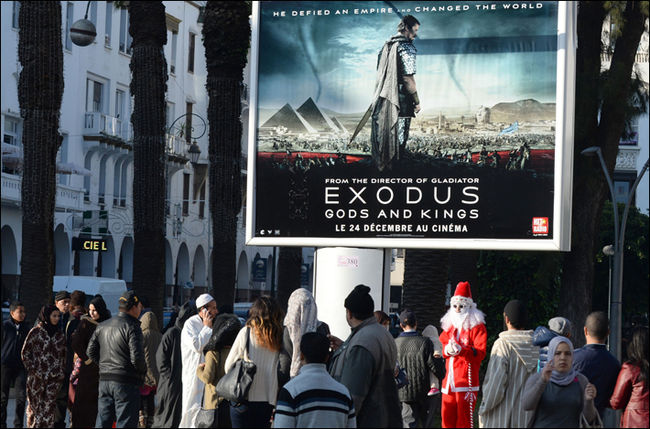By Siham Ali in Rabat
for Magharebia
![Moroccans walk past a billboard for the movie "Exodus" in Rabat on December 26th, 2014 [AFP/Fadel Senna]](http://www.moroccotomorrow.org/wp-content/uploads/2015/01/Exodus2-300x198.jpg)
Moroccans walk past a billboard for the movie “Exodus” in Rabat on December 26th, 2014 [AFP/Fadel Senna]
Morocco required an edit to the film “Exodus”, stirring up a fresh debate over civil liberties under the Islamist-led government.
The film was originally banned last December, before being re-authorised January 7th with the censored scene.
The Moroccan union representing directors and writers criticised the film ban, and expressed concern about the attack on the values of self-expression and creativity. The union’s president, Naoufel Berraoui, said the move would open the door to possible abuses and arbitrary decisions in the future.
Moroccans also spoke out against the decision.
“The state should not be dictating what its citizens are allowed to think,” commented student Karim Bouidali. People are capable of criticising and judging an artistic work themselves, he said.
“The audience for films of this kind has a certain level of education and can easily make up their minds on this film according to their own convictions. We want Morocco to be a place of openness and tolerance. Those who don’t agree with this film can simply boycott it and not go to the cinema,” he added.
Ilham Cherifi, a teacher, struck a similar note, saying that the authorities should not be taking such decisions, which risk dividing Moroccan society.
“Bans and censorship are not the solution. Moroccans are mature people, and we must leave them the choice to make up their own minds. Those who are against an idea or work of art have opportunities to express their disapproval and condemnation,” she said.
Some have criticised the intervention by the government, which is led by the Justice and Development Party, railing against an Islamist stranglehold on the arts.
That accusation was rejected by the director of the Moroccan Film Centre (CCM), Sarim Fassi Fihri, who explained that it is a committee based at the centre that issues the certificate allowing a film to be shown in cinemas or released on DVD.
That committee has five representatives: one from the CCM, one from the culture ministry, one from the communications ministry and two film industry professionals – one representing distributors and the other cinema owners.
He said the reasons why the film was banned were basically to do with security.
The viewing committee – which has sole authority to authorise or ban a film – felt that “Exodus” included sequences that could shock some members of the public, or even provoke violent reactions in some.
But political analyst Jamal Farhani said conservatism and extremism should not be allowed to have a place in Moroccan society on the pretext of maintaining security.
“Fanaticism and conservatism must be defeated, not by resorting to censorship, but through openness and discussion,” he said.
Moroccan society is recognised for its tolerance. We must not give in to panic and half-baked interpretations,” the analyst added.







